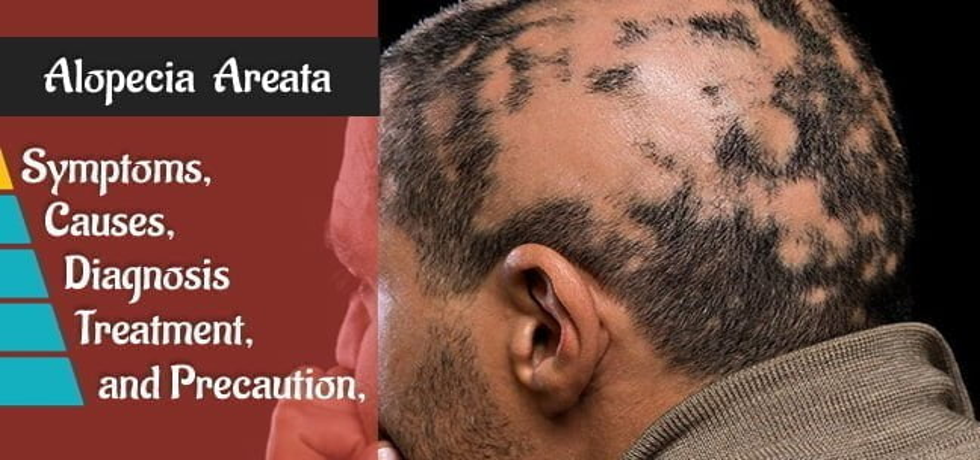
Understanding Alopecia Areata: Symptoms, Causes, and Treatment
Introduction
Alopecia Areata is a form of hair loss that can affect anyone, regardless of age or gender. It occurs when the immune system mistakenly attacks hair follicles, leading to unexpected hair loss in patches. This condition, often characterized by small, round bald spots on the scalp or other parts of the body, can be particularly distressing for those affected. Understanding the symptoms, causes, and treatment options available is crucial for anyone dealing with this condition.
Recognizing the Symptoms
The primary symptom of Alopecia Areata is noticeable hair loss, which usually manifests as small, round patches on the scalp. These patches can be several centimeters in diameter and can also occur in other areas, such as the beard or eyebrows. Some individuals may experience more extensive forms of hair loss, including alopecia totalis, where all scalp hair is lost, or alopecia universalis, leading to complete hair loss across the entire body. Detecting these early signs is essential, as other hair loss conditions can exhibit similar patterns.
What Causes Alopecia Areata?
Alopecia Areata is recognized as an autoimmune disease, meaning the body’s immune system confuses healthy hair follicles for foreign invaders and attacks them. This misdirected immune response causes hair follicles to shrink, halting hair production and leading to hair loss. Additionally, genetics can play a role; if someone in your family suffers from this condition, your risk increases significantly. Stress is also believed to be a contributing factor, impacting the immune system and potentially triggering episodes of hair loss.
Diagnosis and Consultation
To effectively diagnose Alopecia Areata, dermatologists typically begin by evaluating your symptoms and examining the affected areas. Often, they can identify this condition merely by visual inspection. However, in certain cases, blood tests may be necessary to rule out other autoimmune disorders. If you suspect you have this condition, consulting with a qualified dermatologist can provide clarity and guidance for your situation.
Exploring Treatment Options
Treatment for Alopecia Areata varies and can encompass multiple approaches. The most common treatments involve corticosteroids, which help to reduce inflammation and moderate immune system activity. These can be administered through injections, topical creams, or even orally. Other medications, such as Minoxidil, which is famously used for promoting hair growth, may also be beneficial. While these treatments may not prevent new patches from forming, they can assist in regrowing hair in the affected areas.
Precautions and Emotional Wellbeing
Practicing precautions is important for individuals with Alopecia Areata. Wearing protective headwear, such as hats or scarves, can shield the scalp and keep it warm. Protecting the skin from sun exposure with sunscreen is also crucial. Beyond physical care, its essential to address the emotional impact of hair loss. Support groups and counseling can provide a safe space to discuss feelings and challenges associated with this condition, helping to foster resilience and a positive outlook.
Conclusion
If youre experiencing hair loss or suspect you may have Alopecia Areata, it is important to seek professional help. Timely intervention may lead to more effective treatment options. At The Skin Artistry, our dermatologists specialize in providing personalized care for those dealing with hair loss conditions. Whether you’re exploring treatment options or seeking advice on maintaining emotional wellbeing, we are here to help.
FAQ Section
Q: Is Alopecia Areata permanent?
A: Alopecia Areata is not permanent for everyone. Many individuals experience cycles of hair loss and regrowth. However, some may need medical interventions to aid in regrowth.
A: Alopecia Areata is not permanent for everyone. Many individuals experience cycles of hair loss and regrowth. However, some may need medical interventions to aid in regrowth.
Q: Can hair regrow after Alopecia Areata?
A: Yes, hair can regrow after experiencing Alopecia Areata. The degree of regrowth varies from person to person, influenced by individual factors.
Q: Are there ways to manage stress related to Alopecia Areata?
A: Yes, stress management techniques such as mindfulness, yoga, or counseling can significantly help individuals cope with the stress of hair loss.
For professional assistance and expert advice from leading dermatologists like Dr. Hital Patel, experience the benefits of understanding Alopecia Areata with Hair & Skin Specialist Dr. Hital Patel at The Skin Artistry. Our clinics in PDPU Gandhinagar, Vastrapur Ahmedabad, and Hyderabad (Visiting Consultant) offer top-quality care and personalized treatments. Visit us today to learn more about our services and take advantage of our special offers! For more insights, updates, or to collaborate, stay connected with The Skin Artistry.

